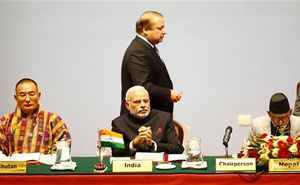 Kathmandu, Nov 27: A thaw in the Indo-Pak ties remained a distant dream on Wednesday as Prime Minister Narendra Modi and his Pakistani counterpart M Nawaz Sharif cold-shouldered each other though they shared the dais at the inaugural session of the 18th summit of South Asian Association for Regional Cooperation (Saarc) here.
Kathmandu, Nov 27: A thaw in the Indo-Pak ties remained a distant dream on Wednesday as Prime Minister Narendra Modi and his Pakistani counterpart M Nawaz Sharif cold-shouldered each other though they shared the dais at the inaugural session of the 18th summit of South Asian Association for Regional Cooperation (Saarc) here.
Despite sitting in the vicinity of each other for a couple of hours in the City Hall, the two leaders did not show any inclination of repeating what A B Vajpayee and Pervez Musharraf, then prime minister of India and president of Pakistan respectively, did in the same city 12 years ago. Musharraf made a surprise move by greeting Vajpayee during the 11th Saarc summit in Kathmandu in January 2002 and the photographs of the handshake that followed were widely publicised.
The Musharraf-Vajpayee meet was the first such encounter between the leaders of Pakistan and India after the Agra Summit of July 2001 failed to achieve any breakthrough.
The expectation of a similar bonhomie on Wednesday, when it was Modi and Sharif’s turn to represent India and Pakistan in the 18th conclave of South Asian leaders, was belied as the two leaders did not greet each other.
As the Saarc summit returned to Kathmandu after 12 years amid a fresh stand-off between India and Pakistan, a similar exchange of gesture between Modi and Sharif could have set the stage for a bilateral meeting on the sidelines. This, however, did not happen, and the two leaders, who had a very cordial meeting in New Delhi in May, were not even seen greeting each other on Wednesday.
When Sharif walked up to the lectern to make his speech, Modi was seen busy looking at some papers. He appeared nonchalant even when other leaders joined the audience in applause as Pakistani counterpart was returning to his seat after delivering the address. Sharif did the same when Modi got up to deliver his address and returned to his seat.
There was also no opportunity for a brief exchange of courtesy even after the conclusion of the inaugural session as Sharif left quickly and Modi chatted with Nepalese Prime Minister Sushil Koirala.
Modi met Koirala soon after his arrival in Kathmandu. He had bilateral meetings with President Ashraf Ghani of Afghanistan, President Mahinda Rajapaksa of Sri Lanka, President Abdulla Yameen Abdul
Gayoom of The Maldives, Prime Minister Tshering Tobgay of Bhutan and Prime Minister Sheikh Hasina of Bangladesh.
Ministry of External Affairs spokesperson Syed Akbaruddin on Wednesday told journalists in Kathmandu that no formal bilateral meeting between Modi and Sharif had been scheduled so far as New Delhi had not received any proposal from Islamabad for such parleys.
India on Tuesday said it would be ready for a dialogue with Pakistan only if it was assured that the parleys would be “meaningfulâ€. New Delhi clarified its position after Sharif told journalists soon after arriving in Kathmandu that the ball was in Modi’s court to restart the dialogue.
At a meeting held a day after Modi’s swearing-in ceremony, the two leaders had agreed that foreign secretaries of the two countries would meet to explore restarting of the stalled bilateral dialogue. India, however, called off the talks in August protesting Pakistan’s move to consult Kashmiri separatist leaders ahead of the parleys.





Comments
Add new comment